Space Happens: Sci-Fi Comedy From a Smart, Female, Millennial Point of View
Ladies need space.
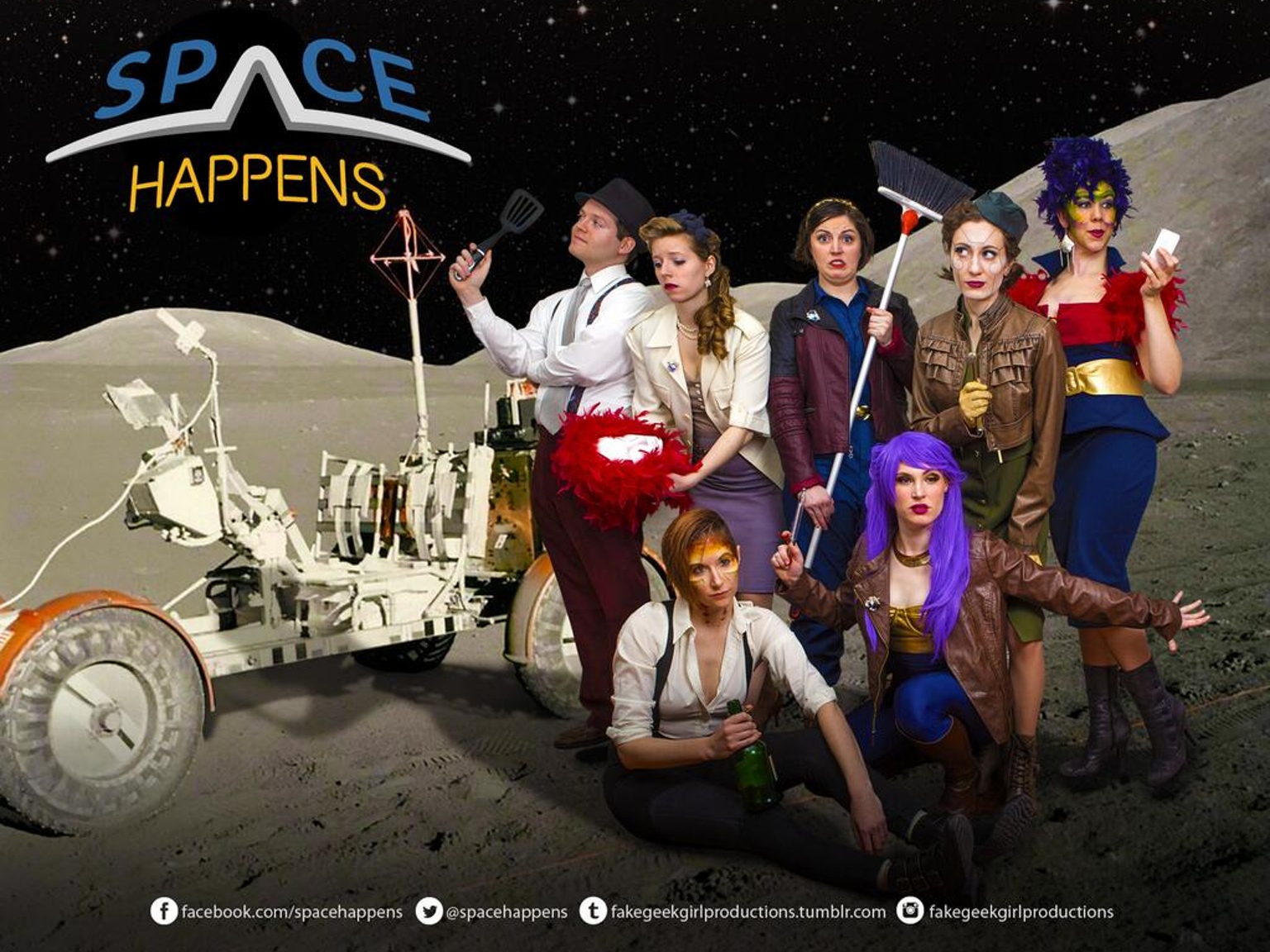
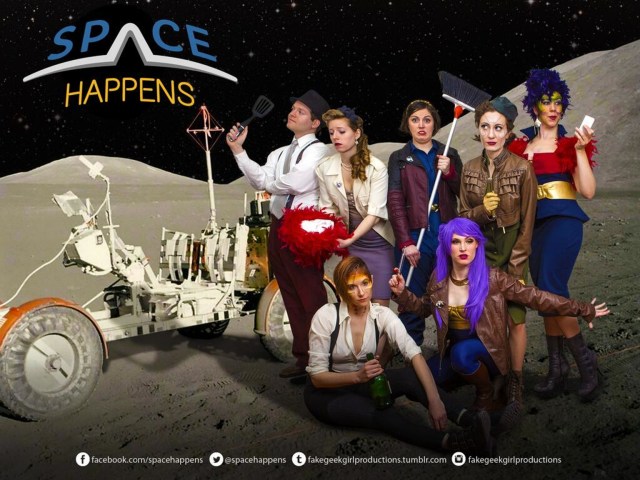
It started when Nicole Keating – creator, writer, and one of the stars of digital series, Space Happens (Fake Geek Girl Productions) – was playing Dungeons and Dragons. It was shortly before The Guild and just after the release of Serenity when the wheels started turning for Keating, leading her and a talented team of Chicago-based women to create what has turned out to be a smart, funny, unapologetically feminine sci-fi comedy from a millennial perspective. One that fully embraces its low budget to hilarious effect.
“The guy who was running the game decided to set it in space just for a nice little twist on the fantasy game,” Keating explains. “It was an all-female game, and that was just something that had been happenstance, but then I thought it would be really fun to see all of these shows that I like to see – the Fireflys, the Star Treks, the Doctor Whos – except with mostly women. As opposed to, you know, one or two on the crew, because that means diversity, I guess? But no, we have this whole crew of girls. And people will still watch, people will still laugh, people will still like it.”
Space Happens tells the story of a young woman named Joy Jones struggling to figure out her destiny. From the website:
Joy Jones would do anything to travel the universe! So, like any passionate youth, she takes the first job she’s offered: a less-than-ideal position aboard Space Alliance transport vessel, the HMS Janeway. She works hard, but no one seems to notice how totally baller she is. Until, that is, she is unexpectedly promoted. To captain. Of the whole ship.
No big deal.
So begins Space Happens, the tale of Captain Joy and her new ship, a ship which harbors a dark secret that threatens to destroy the universe. Will her crew of rejects and rebels help her save it? Or will they succumb to battles and bad guys, stresses and expectations?
Little do they know that there is a force darker than their own failings, a force plotting their downfall.
Joy is played by Alyson Grauer, who met Keating through the Chicago theater scene, and was one of the show’s original producers before stepping away from that side of things to play the lead role. She took part in the initial writing sessions during which, she says, they asked themselves “What would we want out of a web series? As women who do comedy? What were we interested in in sci-fi?” The working title was Bitches in Space (which they changed so as not to alienate anyone), and the original tagline? Bitches need space. “I will take full credit for creating the name Syzygex for the big-bad corporation,” she laughs. “And it was inspired by the X-Files episode “Syzygy,” obviously. There’s layers here. There’s layers.”
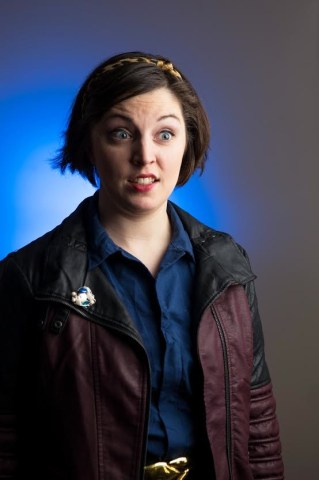
Alyson Grauer as Joy Jones
Space Happens is allowing Grauer to live a childhood dream. “I have wanted to be the captain of a starship since I was, like, five,” Grauer explains. “That’s been a long-term goal for me. So when we started talking about doing a sci-fi comedy, I was like CAN I BE THE CAPTAIN?! And they were like Yeah, obviously.” Joy was written with her in mind – actually, that’s the case for all the roles, as they cast before they wrote the scripts – and it was her ability to not take herself too seriously that made her perfect for the role, according to the rest of her team. “We definitely intended for Joy to be Everywoman. To start in a place where she’s very unhappy with her job, and her life, and her hopes have been dashed on the rocks of reality. But that despite her healthy amount of flaws and confusion, that she’s very capable underneath all that. Nicole said early on that she wanted me to be the window into this goofy, satirical world we were making. I’m pretty sure it’s the faces I make. From what I gather, everyone is like Thank God Aly’s here, she’ll just make a face, so it’ll be a funny scene now.”
Another member of the original production team, Melissa Fox, started out primarily wanting to focus on the business side of things, helping to grow Fake Geek Girl Productions as a company, but she got lured into the cast and ended up bringing the character of the show’s Han Solo-esque pilot, Scarlet Swingline, in with her.

Melissa Fox as Scarlet Swingline
“Scarlet was an idea that I came up with a few years before,” she explains. “When I was attending Teslacon in Wisconsin, which is a steampunk convention. Yes, I love steampunk.” She created Scarlet as part of an airship crew with whom she went to the con. “I brought Scarlet to Space Happens, because she was someone that I already knew, and she had a lot of personality traits that were similar to mine. She’s just a highly jacked-up version of what I could be if I were given speed or cocaine or something to kick me up a notch. She’s actually a lot like me when I’ve been drinking, because she gets loud, she gets sarcastic. [laughs] It’s not too much for me to get to Scarlet, because I know what I get like in that situation, so I just take that and amplify it.”
Meanwhile, in addition to being the show’s “Gene Roddenberry,” as they lovingly refer to her, Keating also plays a role on the show. She’s MLDRD-42-B221 (Code Name: Mildred), a genetically augmented killing machine who happens to have great style. This type of character was one of many sci-fi/fantasy/action tropes at which Keating wanted to poke some fun:
Mildred was based on all of these roles like Black Widow – any of these roles Scarlett Johansson plays, basically. It was a play on That Girl – she’s always dressed in skin-tight leather, and she’s always doing these cool moves, but the way they’re shot it’s always with just a little more emphasis on the butt.
For example, the scene in The Avengers where [Black Widow’s] talking to Loki and she’s just sort of won the game. She was spying on him the whole time, she was playing him. But then she turns around and walks away, and they immediately undercut that by having him look at her butt and having the focus be on her butt. We thought that’s something we can really, really make fun of.
The other half of [Mildred] is that a lot of these characters are made masculine in some way. Like they’re saying Oh, we can focus on her butt, because she’s actually a tomboy and she ‘kicks-ass’ – she’s ‘a badass,’ but they don’t allow them to be feminine. And it’s like, if there’s this woman in this skin-tight bodysuit, chances are she didn’t choose that for practicality, she chose that because it looks good, and that means she’s enjoying being a girl, she’s enjoying her femininity. And why can’t we have someone who talks like a Valley girl, but is also a powerful physical force?
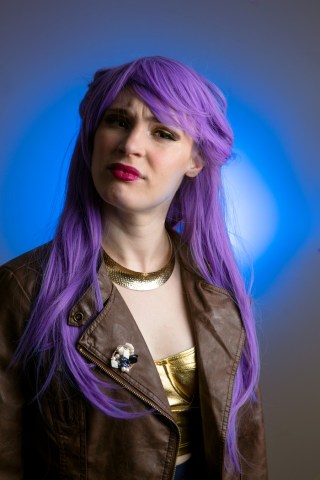
Nicole Keating as Mildred
The original team gained and lost members in the subsequent years, as the team started a writers room and went about the business of fundraising. Keating’s high school friend, Liz Rodriguez, who is a PhD candidate in Renaissance literature, is head writer on the show, and was invited to bring her expertise in analyzing classic stories and her geekiness about Shakespeare to the project to hone the scripts.
“I consider myself geeky about history and literature,” Rodriguez tells us. “But I’m not really a comic book gal, or into comic book movies. It was comedy that I think was the biggest thing that I was able to get us to focus on. At the end of the day, this needs to be funny, and the narrative needs to be cohesive. I hope that my training as a PhD candidate contributed to that as well. I mean, I look at stories, narratives, and how we talk to each other about our experiences all the time. Those things translate whether you’re talking about a 17th Century play or a 21st Century web series.”
One of the more intriguing things about Space Happens is not the fact that it’s a mostly-female sci-fi comedy, that that it speaks specifically from the millennial point of view. Each of the women The Mary Sue spoke with had some interesting things to say about why and how they explore millennial women through sci-fi.
Grauer on how the show’s Millennial focus led to the creation of Joy:
It’s funny, I was listening to the radio with my dad the other day, and they were talking about some headline somewhere like, Millennials Now Requesting Naps and Board Games at the Office, and We wanna hear from Millennials about this and can you call in let us know what you think? And, of course, no millennials called in. It was all people over the age of forty who called in and were like Suck it up! Work is work! You don’t get a nap! And I had to turn the radio off. I couldn’t listen to this. Partly because – if the millennials are asking for naps…they probably need a nap! Why do they need a nap? That’s really what we should be looking at. Not Why are these kids so weak? But, Why is this happening? What’s different about this demographic socially that is making them long for recognition and comfort?
We don’t all necessarily consider ourselves Millennials, but we all have felt the effect of being attributed to millennial entitlement. And whether it’s because we’re women, or it’s because we’re on the cusp of that generation, I’m not sure. But it’s definitley something we’ve kept in mind. There are a couple of people you’ll meet on the crew [on Space Happens] that say to Joy You don’t just get to have what you want. You have to work for it. The difference is, as far as Joy is concerned, she has worked for it. Did she steal that ship? Yes. But she had to. And she put in her time on the corporate vessel. She put in her time scrubbing the floors, because that’s what they told her to do.
Rodriguez on the lies both Millennials and women are told:
I think I’m technically a millennial, but I’m an old millennial – I’m 28 – and I occasionally teach at Northwestern, and the students I have are that prime millennial demographic. And it’s really interesting to see on the one hand how privileged they are, and the things they’ve come to expect, but on the other hand how super-smart they are and how hard they work. And I see Joy is part and parcel of that. So they’re getting it from the Gen X-ers and the Boomers who are saying In my day, people weren’t this entitled and people had to work for things! And yeah, they did, but they also would graduate into a job where they’d be able to support a family on a single income.
[Carol Spaceberg – a parody of Sheryl Sandberg] is a way of satirizing all of the ways in which [women] are told that you have control over your destiny if you work hard enough. And that’s simply not true. It’s like, yeah if you work hard enough, and you also have mentors from Harvard, and incredibly wealthy parents who can send you to the best schools, and you get a crazy internship right out of college, and you have a husband at home that can take care of everything you need, and you have a housekeeper and a babysitter, then if you work hard enough, you’ll get everything you want.
The way that Carol Spaceberg becomes an antagonist in the show is that, despite the best intentions, she shows how nobody really does has the perfect advice for millennials. Because this is a new economy. We’re all trying to figure it out. And unfortunately, these somewhat coddled millennials are having to figure it out on their own, when they were told that everything would be made for them.
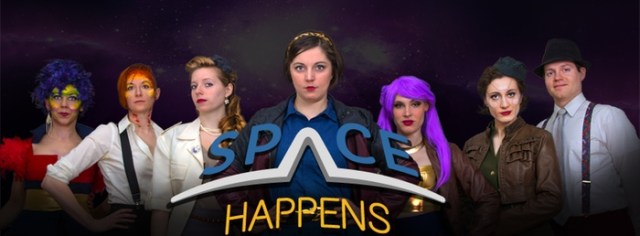
Fox on there being no room for Millennials:
It’s an allegory for all of us, but in my personal experience – when i was in high school, I had no idea what I wanted to do. I thought, I’m good at math, I’m good at art. I’ll go into graphic design! Why not? So I applied to the colleges, I looked at the programs…and they said Oh yeah, there are so many graphic design jobs right now. That’s perfect! You should totally go do that. So I was like Sweet! I go to school, get my Bachelor’s, graduate. And then the recession hit. And they were cutting graphic design jobs. There was absolutely nothing available. I searched and worked retail for about two years, then said Forget this. I moved back to Chicago from where I was and went back to school for business. Just before I graduated, I got a real, salaried office job. So, honestly, I had to follow a different set of steps than I expected to become successful. One thing I’ve noticed about a lot of millennials is yes, their first choice in career is probably not gonna work out. We all had parents who were like Follow your dreams. Do what you wanna do. Everytihing is fine. We got jobs. We were part of the boom. Everything grew. Everything’s gonna keep growing. There’s definitely space for you in the world. And then as soon as we got there, it seems like they ran out of space. That’s definitely one of the primary themes that we wrote into it. We put a lot of thought into that when we started writing, because all of us have the same frustrations.
Keating on the need for a female, Millennial, sci-fi voice:
One of the things that I truly love about fantasy and sci-fi, is that I feel like when I read stories like Harry Potter, I’m not just reading a story about a wizard, I’m reading an allegory for growing up and coming of age. And when you’re going through it at that age, it feels like you’re fighting the Dark Lord. It doesn’t feel like you’re just going to school. So, fantasy and sci-fi takes how things like that feel, and say What if you really were fighting the Dark Lord. What if it really were as big as it felt? And don’t know that anything’s done that yet in terms of the millennial story – particularly for the millennial woman. You see things like Girls, you see things like Broad City, you see things that are very realistic – hyper-realistic. We wanted to take that spirit and say No, no, no, we like Girls, we like Broad City, but the places our imaginations go are beyond the streets of New York. They can be in space, they can be in some crazy fantasy realm.
Space Happens is currently three episodes into its first season, and Fake Geek Girl Productions isn’t stopping there. There are already two other planned series in the works, and several podcasts – including Rude Tudors, a podcast hosted by Rodriguez and Keating where they relate the disturbing and disgusting facts about the Renaissance to modern times (and they’ve even given The Mary Sue a shout-out on occasion). They’ll also be at C2E2 on Saturday in Artist Alley by booth K3 at 1pm visiting with Joel D. Siegel, who drew their Space Happens Kickstarter reward comic.
With Space Happens, they want to bridge the gap between “women’s stories” and “men’s stories.” Keating says, “We want to show these female stories, but we want men to partake in them, too. We don’t wanna say this is only for women, because that’s the stereotype: you make a movie about a woman, it’s only gonna be meaningful for women; you make a movie about a man, it’ll be meaningful for everybody. Genre is a cool way to bridge the gap, and to say Hey, you might not want to watch Sex in the City, but I bet you wanna watch Wonder Woman!”
—Please make note of The Mary Sue’s general comment policy.—
Do you follow The Mary Sue on Twitter, Facebook, Tumblr, Pinterest, & Google +?
Have a tip we should know? [email protected]